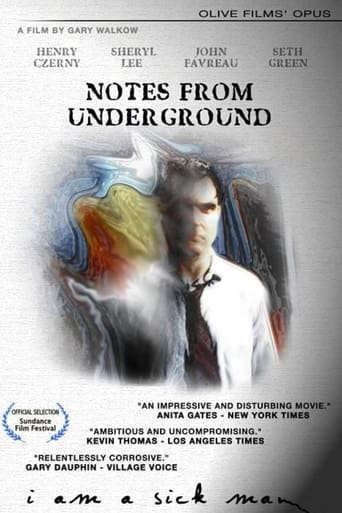mary293
I loved this movie. It is dark, but well acted and I thought quite hilarious (in a life isn't always so great--I wish I could do that kind of way). Henry Czerny possesses such an intensity, "victim" portrayal and convincing self-hatred; it is not difficult to understand why he acts as he does (even though the past wrongs done to him are vague).Anyone who has experienced alienation from a group or hating who they are/what they were doing but couldn't stop the compulsion to cease their behavior, will be able to relate and appreciate the dark humor of this film. I caught it on IFC years ago by accident and my sister and I were both so unexpectedly drawn to the film we could not turn the channel!
chloe jones
Ignore the last user, this film is definitely worth the view. As a big Dostoevsky fan and film nerd I remember seeing this film listed on the line up for the Boston film festival and was immediately intrigued.I'm very picky when it comes to adaptations of books I like, so I was pleasantly surprised with how well cast the film was. Czerny was a brilliant underground man and Lee (better known at that time from her Twin Peaks fame) was a perfect blend of hard and vulnerable. The only casting choice I was somewhat iffy on was Jon Favreau, who was just starting the "Swingers" hype, I just never pictured him to be the right age and sort for the role.Adapting a book whose entire structure is the monologue ramblings of a conflicted character is not an easy task, but here the film is a perfect blend of snide voice over, action and still manages to convey the spirit of the novel.I'll always remember the Boston Globe reviewer commenting that he never thought one could put Dostoevsky and comedy in the same thought, but somehow this film had. I agree, though I always knew Fyodor had has witty side.All in all I was greatly saddened that the film never got a wide release after that, so I never saw it again, pity I'd have dragged all my literary minded friends to it.
jeannedarc714
For anyone who has read Dostoevsky's novel upon which this film is based, they will be pleasantly surprised to find that Gary Walkow has done a superb job of adapting it to the screen and placing the story in a modern context. Of course, those who haven't read the book will not be disappointed--it stands on its own as a relentless critique of (post)modernity and an examination of forms of all-inscribing social control that permeate one human being's alienated existence. The Underground Man (played brilliantly by Henry Czerny) is, in his own words, "a sick man". In every interaction he sees only the potential to dominate or be dominated; human relations for him are a disease. He is spiteful, frightened, and ashamed of his condition and his perceived inability to change. In order to mitigate the sting of such painfully acute self-awareness/self-consciousness, the Underground Man creates a video diary, in which he records his "confessions" about his interactions with others. These "confessions", while "sincere" expressions of self-loathing and a tortuous desire to change, end up being ultimately dishonest--he cannot even finish some entries because of his awareness that confessions for an unseen "audience" provide him with nothing but shallow comfort and artificial relief.In the film we see the Underground Man fantasize about becoming the strong, desirable, upright person he wishes to become, only to later criticize these fantasies and his reliance upon the very constructs or images of "strong", "desirable", and "upright" he so despises. It is the perceived irreducibility of this cycle that causes him to feel ashamed of his helpless condition. However, he is also plagued by guilt: somehow he sees within himself the ability to change. His intimate knowledge of the reducibility of "consciousness" forces him to acknowledge that man remains, in the words of Sartre, "condemned to freedom."Again, this film marvelously realizes Dostoevsky's vision in its portrayal of the Underground Man. Sheryl Lee's talent in the role of Liza, the prostitute, is highlighted as well. Jon Favreau, in a rare pre-"Swingers" performance, plays Zirkov, the Underground Man's more successful college acquaintance. Seth Green also appears in this early indie film.This film (and the book, of course) come highly recommended, with 10 stars. One's perception of the world and of interactions with others cannot possibly be left unaffected by Walkow's brilliant adaptation and Czerny's performance.
john-hurley-2
When I saw this film, I was aware that it was a retelling of a Dostoyevky story but not one I had read it. I still found it a very enjoyable film, which held my attention the whole way.The self-defeating, somewhat neurotic protagonist manages to mess up every opportunity of improving his life that comes his way but manages to do so from a position of either moral or intellectual superiority. He justifies logically all his disastrous decisions and questions the sanity of anything he does that is motivated by emotion. He can't see the point.He vacillates constantly between rejecting everyone around him and craving their love, friendship or forgiveness. Having met the "hooker with a heart of gold" who tidies his flat and, uniquely in the film, shows him respect and love, he drives her away with brutality and insults. In a momentary spell of remorse, he searches for her in the rain-soaked streets and looking back on this act in his video diary asks: "Why did I look for her? If I had found her, I would just have got back with her and tormented her again"The acting is excellent, the photography tight and claustrophobic, which suits the protagonists tiny world. The editing cuts between his direct contributions to video diary, historical narrative and his flights of fancy at various points. It DID make me want to read the book but I think the film a work that stands up well on its own.



